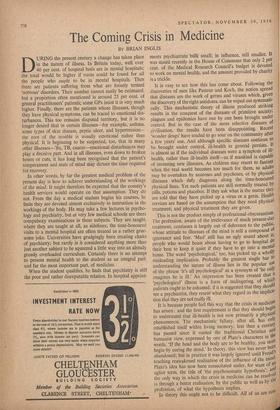The Coming Crisis in Medicine
By BRIAN INGLIS DUR1NG the present century a change has taken place in the nature of illness. In Britain today, well over 40 per cent. of hospital beds are in mental hospitals; the total would be higher if room could be found for all the people who ought to be in mental hospitals. Then there are patients suffering from what arc loosely termed `nervous' disorders. Their number cannot easily be estimated, but a proportion often mentioned is around 25 per cent. of general practitioners' patients; some GPs insist it is very much higher. Finally, there are the patients whose illnesses, though they have physical symptoms. can be traced to emotional dis- turbances. This too remains disputed territory, but it is no longer denied that in certain illnesses—for example, asthma. some types of skin disease, peptic ulcer, and hypertension— the root of the trouble is usually emotional rather than physical. It is beginning to be suspected, too, that in many other illnesses—'flu, TB, cancer—emotional disturbances may play a decisive part. And in all illnesses, even down to broken bones or cuts, it has long been recognised that the patient's temperament and state of mind may dictate the time required tor recovery.
In other words, by far the greatest medical problem of the present day is how to achieve understanding of the workings of the mind. It might therefore be expected that the country's health services would operate on that assumption. They do not. From the daj, a medical student begins his courses, he finds they are devoted almost exclusively to instruction in the workings of the body. He may take a few lectures in psycho- logy and psychiatry, but at very few medical schools are there compulsory examinations in these subjects. They are taught, where they are taught at all, as sidelines; the time-honoured visits to a mental hospital are often treated as a rather grue- some joke. Universities have grudgingly been creating chairs of psychiatry; but rarely is it considered anything more than just another subject to be squeezed a little way into an already grossly overloaded curriculum. Certainly there is no attempt to present mental health to the student as an integral part. and far the most important part, of medicine.
When the student qualifies, he finds that psychiatry is still the poor and rather disreputable relation. In hospital appoint- ments psychiatrists btilk small; in influence, still smaller. It was stated recently in the House of Commons that only 2 per cent. of the Medical Research Council's budget is devoted to work on mental health; and the amount provided by charity is a trickle.
It is easy to see how this has come about. Following the discoveries of men like Pasteur and Koch, the notion spread that diseases are the work of germs and viruses which, given the discovery of the right antidotes, can be wiped out systemati- cally. This mechanistic theory of illness produced striking results in the conquest of the diseases of primitive society; plagues and epidemics have one by one been brought under control. But in the case of the more selective diseases of civilisation. the results have been disappointing. Recent `wonder drugs' have tended to go sour on the community after a few years' use. And although specific diseases continue to be brought under control, ill-health in general persists. It is almost as if the individual diseases were a symptom of health, rather than ill-health itself—as if mankind is capable of inventing new illnesses. As children may resort to fantasy when the real world becomes too much for them, so adults may be overtaken by neuroses and psychoses, or by physical illnesses which defy diagnosis along the time-honoured physical lines. Yet such patients are still normally treated by pills, potions and placebos. If they ask what is the matter they are told that they have picked up a virus or a germ. Health services are based on the assumption that they need physical treatment; and physical treatment they are given.
This is not the product simply of professional obscurantism. The profession, aware of the irrelevance of much present-day treatment, continues it largely out of deference to the public, whose attitude to illnesses of the mind is still a compound of ignorance and fear. 'Mad' still has an ugly sound about it people who would boast about having to go to hospital do their best to keep it quiet if they have to go into a mental home. The word 'psychological,' too. has picked up a whollY misleading implication. Probably the greatest single bar to understanding the nature of illness lies in the popular use of the phrase 'it's all psychological' as a synonym of 'he only imagines he is ill.' An impression has been created that a `psychological' illness is a form of malingering, of which patients ought to be ashamed; if it is suggested that they should see a psychiatrist, they resent what they regard as the iMplica" tion that they are not really ill. It is because people feel this way that the crisis in medicine has arisen : and the first requirement is that they should begin, to understand that ill-health is not now primarily a physical phenomenon. The mechanistic fallacy. after all, has onlY established itself within living memory; less than a century has passed since it ousted the traditional Christian and humanist view, expressed by one of Plato's characters in the words, 'If the head and the body are to be healthy. you must begin by curing the mind.' In theory. this view has never been abandoned; but in practice it was largely ignored until Freud s teaching reawakened realisation of the influence of the mind' Plato's idea has now been resuscitated under, for want of an uglier term, the title of 'the psychosomatic hypothesis': an", the only way in which the crisis in medicine can be resolve' is through a better realisation, by the public as well as by the profession, of what the hypothesis implies. In theory this ought not to be difficult. All of us are ea' stantly experiencing psychosomatic reactions — physical symptoms brought on by emotional changes. Anybody who suffers from blushing can understand that there may be a link between skin troubles and a chronic feeling of guilt. Any- body who has felt fear grip his bowels can understand that there may be a link between chronic fear—worry—and stomach trouble. Anybody who feels his heart beat faster, or his breath come shorter, in moments of suspense, can under- stand that there may be a link between chronic suspense- strain—and heart or lung diseases. No catastrophic revolution of thought should be required, therefore, to familiarise the public with the stress theory of disease; that diseases are not so much entities in themselves, as the products of the inter- action between the human constitution and the stresses to which it is exposed.
A sensible way to attack the problem of disease, therefore. would be to cease devoting all available resources to the attempt to find cures for the individual diseases—if they are only symptoms—and to find and grapple with the tensions produced in the unconscious mind by the various stresses of modern life. This does not mean that anybody who feels the onset of a cold in the head should rush around to the nearest psychoanalyst for a session on the couch. Illnesses Which arise out of emotional disorder may require physical remedies : a man, after all, may be run down by a bus because, preoccupied with his private worries, he steps off the pave- ment; but that is not to suggest a psychiatrist should be called in to set his broken leg. And even where the psychiatrist is called in, he may himself recommend some physical treat- ment, drugs, electric shocks or an operation on the brain— though the value of such methods is disputed. The psycho- somatic hypothesis may be accepted without assuming that easy cures are just around the corner; probably most psychia- trists would agree that in the present limited state of their knowledge of the interrelationship of mind and body they have more to offer in the field of prevention—in helping people to recognise, understand and come to terms with stresses before they begin to do physical damage—rather than in offering cures.
Still, the undeveloped state of knowledge of psychosomatic medicine ought not to be allowed to be used, as it so often is, as an excuse to keep the psychiatrist in the background. On the contrary, he should be given far greater access to patients. There is no disease in the books with which the psychiatrist may not have some concern—even if it is only in how to ease the patient back into everyday life after it is finished. But in only a few hospitals at present does the psychiatrist have the scope he requires; in most, he is regarded as a kind of long-stop, to be called upon only when all other treatments fail—sometimes not even then : to this day many patients with chronic skin com- plaints continue to receive palliative treatment with drugs and lotions, year in, year out, with never a thought of invoking psychiatry. And although the responsibility for this lies to a great extent with the public antipathy to psychiatry, it also lies with the profession. To put it bluntly, the profession, while accepting the psychosomatic hypothesis in principle, has done much to hinder and delay its translation into practice.
[To be concluded]



















































 Previous page
Previous page